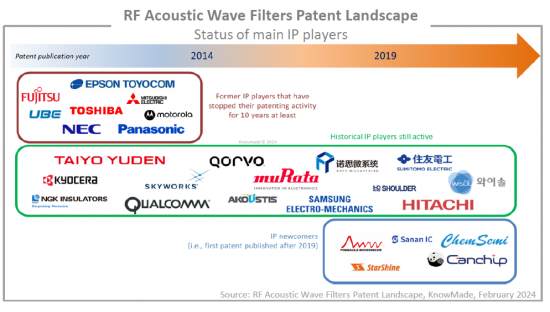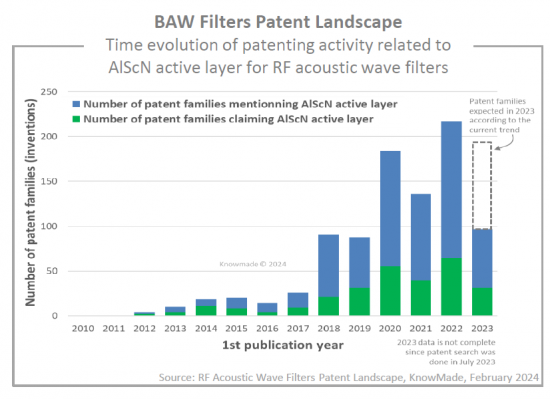
본 보고서에서는 세계 RF 탄성파 필터 시장의 최신 특허 동향을 분석하여, 공개 특허의 시계열 변화, 주요 기술별(SAW, BAW 등)/특허 출원 국가별 동향, 특허의 법적 지위 등 IP 동향, 주요 기업의 IP 프로파일, 중국 국내 상세 동향 등의 정보를 정리하여 전해드립니다.
1990년대 이후 음향 필터 산업은 저대역용 탄성 표면파(SAW) 필터와 고대역용 탄성 표면파(BAW) 필터의 두 가지 주요 기술로 나뉘어져 왔습니다. 이 시장과 기업은 이미 확립된 시장이며, 제품, 기술 및 노하우는 대규모의 강력한 지적재산권(IP) 포트폴리오로 보호되고 있었습니다. 무라타제작소와 스카이웍스는 SAW 특허를, 브로드컴은 BAW 특허를 보유하고 있었습니다. 이동통신 서비스와 네트워크의 확대로 인해 주파수 대역은 점차 넓어지고, 높아지는 추세입니다. 예를 들어, 5G용도에서는 6GHz 이하 대역(예: 3.3-3.8GHz(B78), 3.3-4.2GHz(B77), 4.4-5.0GHz(B79)) 외에 밀리미터파 대역(예: 24.25-29.5GHz(B257, B257, B258, B261), 37-40GHz(B260))의 주파수가 필요합니다. 더 높은 주파수에 도달하는 것도 과제 중 하나이며, 또 다른 과제는 더 높은 주파수에서 작동할 뿐만 아니라 더 넓은 절대 대역폭과 상대 대역폭을 제공하는 RF 필터를 제공하는 것입니다.
현재 SAW와 BAW 디바이스는 3GHz 이하 대역의 요구사항을 충족하고 있습니다. 하지만 3-5GHz 대역으로 넘어가면 많은 문제가 발생한다. SAW 장치는 전극의 폭을 점점 더 좁혀야하므로 손실이 커지고 전력 처리가 감소하며 리소그래피 비용이 높아집니다. BAW 장치도 마찬가지로 압전 결합이 상대적으로 작기 때문에 필요한 광대역폭을 지원할 수 있는 능력이 부족합니다. 따라서 손실, 전력, 열 문제 및 3GHz 이상의 대역폭 요구 사항을 충족하는 새로운 솔루션이 매력적으로 다가옵니다.
이러한 제약을 극복하기 위해 각 기업들은 새로운 기술을 찾고 있습니다. 새로운 솔루션에는 전기 음향 결합 특성을 향상시키기 위해 ScAlN 또는 Sc 도핑된 AlN 압전 필름을 사용한 BAW 개발이 포함됩니다. 한편, 새로운 복합 기판의 개발은 SAW 분야에 새로운 문을 열었습니다. 마지막으로, 횡방향 여기 BAW(LBAW) 기술도 경쟁에 뛰어들었습니다.
많은 기업들이 이러한 진화를 유리한 시장에 진입할 수 있는 기회로 보고, 5G를 위한 차세대 RF 필터의 차세대 공급자가 되기를 원하고 있습니다. 이처럼 신규 진입자뿐만 아니라 기존 기업들도 치열한 경쟁에 뛰어들고 있으며, IP는 이러한 전략을 뒷받침하는 주요 도구가 될 수 있습니다. 또한, 미국과 중국의 기술 경쟁은 중국의 국가적 공급망 발전으로 이어졌습니다. 이러한 요소들이 결합되어 매우 역동적이고 경쟁이 치열한 산업으로 발전하고 있습니다.
이러한 상황에서 RF 탄성파 필터 특허 현황 보고서는 현재의 지적 재산권 활동을 이해하고 기업의 시장 전략을 어떻게 지원할 수 있는지를 이해하는 것을 목표로 합니다. 25,000개 이상의 특허를 분석함으로써 각 기업이 어떻게 지적 재산을 활용하여 지위를 확보하거나 새로운 시장 점유율을 확보할 수 있는지에 대한 고유한 관점을 얻을 수 있습니다.

이 보고서는 SAW 필터, BAW 필터 및 이를 사용하는 멀티플렉서 및 RF 프론트엔드 모듈과 관련된 11,000개 이상의 특허 제품군(발명)을 수작업으로 추출하여 현재 세계 IP 환경의 추세와 동향을 개관합니다. 특허 분석을 통해 공급망을 따라 각 기업의 위치를 설명하고, IP 포트폴리오를 강화하기 위한 전략을 밝히고, 다른 기업의 특허 활동과 영업의 자유를 제한하는 능력을 강조하고, 유망한 신규 기업을 식별하고, 미래의 IP 리더를 예측합니다. 또한 이 보고서는 유망 기술에 대한 각 기업의 IP 포지션을 파악할 수 있도록 도와줍니다. 새로운 기술 개발에 참여하는 주요 기업을 식별하고, 이러한 문제를 해결하기 위한 주요 해결책을 설명합니다.
이 보고서는 SAW와 BAW의 IP 상황에 큰 차이가 있음을 강조하고 있습니다. 한편, SAW 필터의 개발은 이미 높은 성숙도에 이르렀고, IP 기업들은 모듈식 설계와 필터 아키텍처로 눈을 돌리기 시작했습니다. 특정 분야에 특화된 혁신가들이 IP 정세를 지배하고 있어 도전하기 어려울 것으로 보입니다. 한편, BAW의 IP 환경은 치열한 경쟁이 특징이며, 최근 Broadcom과 Taiyo Yuden의 특허 활동이 감소하고 AlScN 압전 층의 부상과 결합하여 많은 중국 기업과 기존 SAW 기업이 놓칠 수 없는 새로운 기회를 창출하고 있습니다.
이 보고서를 통해 중국 주요 기업의 현재 IP 위치를 파악할 수 있습니다.
이 보고서는 가장 주목해야 할 중국 특허권자를 식별하고, 이들이 국내 공급망을 구축하기 위해 IP를 어떻게 발전시키고 있는지를 처음으로 분석합니다. 또한, IP 분석을 통해 특허를 해외로 확장하여 국제적인 IP 전략을 실행하고 있는 중국 기업을 식별합니다. 마지막으로, 가장 주목할 만한 중국 기업의 특허 활동을 종합적으로 조사하고 최근 몇 년간의 기술 발전을 분석합니다.

5G의 요구 사항은 몇 가지 새로운 기술 개발로 이어지고 있습니다. 가장 눈에 띄는 것은 필터에 사용되는 기판과 재료에 관한 것입니다. 복합 압전 기판과 AlScN은 요구 사항을 충족하는 가장 유망한 기술 중 하나가되었습니다. KnowMade는 향후 10년 동안 기술을 확보하기 위해 이러한 기술과 관련된 특허를 출원하는 것이 필요할 것으로 보이며, KnowMade는이 특정 IP 부문의 상황을 처음으로 분석하고 어떤 회사가 가장 강력한 IP 포트폴리오를 보유하고 있는지 조사 할 것입니다.
이 섹션에서는 주요 기업(Murata/Resonant, Skyworks, Qualcomm, Taiyo Yuden, Samsung Electro-Mechanics, ROFS Microsystem, Akoustis, Qorvo, Qorvo, Kyocera, Wisol) 및 중국의 신규 IP 기업(MEMSonics, EpicMEMS, StarShine, Sanan IC, Sappland Microelectronics)이 보유한 IP 포트폴리오에 초점을 맞추고 있습니다.
이 보고서에는 분석에서 분석된 모든 특허를 포함하는 광범위한 Exce 데이터베이스도 포함되어 있습니다. 이 편리한 특허 데이터베이스는 다기준 검색이 가능하며, 특허 공개 번호, 업데이트된 온라인 데이터베이스에 대한 하이퍼링크(원문, 법적 상태 등), 우선일, 제목, 요약, 특허 양수인, 부문(SAW, BAW, LBAW/XBAR, 멀티플렉서, RF FEM) 등을 포함하고 있습니다. RF FEM)이 포함되어 있습니다.
Murata, Taiyo Yuden, TDK Epcos, Skyworks, Kyocera, Qualcomm, Broadcom, Hitachi, Toshiba, Toyo Communication Equipment, Samsung Electro Mechanics, Qorvo, Seiko Epson, Oki Electric Industry, LG Innotek, NDK, NEC, Epson Toyocom, Sanyo Electric, Samsung Electronics, NGK Insulators, Philips, Intel, Japan Radio, Nokia, Thales, Advanced Saw Products, Motorola, Wisol, Ube Industries, Mitsubishi Electric, Sumitomo Electric Industries, LG Electronics, China Electronics Technology (CETC), Alps Electric, Tianjin University, Toko, Sappland Microelectronics Technology, Zenith Radio, Texas Instruments, Sony, Intellectual Ventures Holding, Resonant, STMicroelectronics, Institute of Acoustics - Chinese Academy of Sciences, Mitsubishi Materials, CEA, Shoulder Electronics 등이 있습니다.
Since the 1990's, the acoustic filter industry has been divided into two main technologies: surface acoustic wave (SAW) filters for the lower bands and bulk acoustic wave (BAW) filters for the higher bands. This market and the players were well-established, and their products, technologies, and know-how were protected by large and strong intellectual property (IP) portfolios. Murata and Skyworks were leading the SAW patent landscape, while Broadcom was leading the BAW one. The expansion of cell phone services and networks drove the need for progressively wider and higher frequency bands. 5G applications, for instance, require frequencies in the sub-6GHz range (e.g., 3.3-3.8 GHz (B78), 3.3-4.2 GHz (B77), 4.4-5.0 GHz (B79)) as well as mm-wave bands (e.g., 24.25-29.5 GHz (B257, B258, B261), 37-40 GHz (B260)). While reaching higher frequencies is one part of the challenge, the other part is to provide RF filters that not only work at higher frequencies, but also offer wider absolute and relative bandwidths.
Currently, SAW and BAW devices fulfill the requirements for bands below 3GHz. However, when it comes to the 3-5 GHz range, numerous issues arise. SAW devices require increasingly narrower electrodes, which result in higher losses, reduced power handling, and more expensive lithography. BAW devices likewise have relatively small piezoelectric coupling and lack the capacity to support the wider bandwidths required. Therefore, new solutions that address losses, power, thermal issues, and bandwidth needs above 3 GHz will be attractive.
To overcome these limitations, players are looking for new technologies. New solutions include the development of BAW with a ScAlN or Sc-doped AlN piezoelectric film in order to enhance the electroacoustic coupling characteristic. On the other hand, the development of new composite substrates has opened new doors for the SAW segment. Last, laterally excited BAW (LBAW) technology has also entered the race.
Many players have seen this evolution as a good opportunity to enter this lucrative market and explicitly desire to be the upcoming provider of the next generation of RF filters for 5G. Newcomers as well as established players have thus entered a fierce race in which IP can be a major tool to support their strategy. Furthermore, the US vs. China technology battle has led to the development of a national supply chain in China. All these elements are adding up to result in a very dynamic and competitive industry.
In this context, the RF Acoustic Wave Filters Patent Landscape report aims to understand the current IP activities and how they can support the market strategies of players. The analysis of more than 25,000 patents offers a unique view of how players can leverage their IP to secure their position or conquer new market shares.

In this report, we have manually selected more than 11,000 patent families (inventions) related to SAW filters, BAW filters, and multiplexers and RF front-end modules using them, and provide a general overview of today's IP landscape global trends and dynamics. Through patent analysis, we describe the position of players along the supply chain, unveil their strategies to strengthen their IP portfolio, highlight their capability to limit other firms' patenting activity and freedom-to-operate, identify promising new players, and forecast what would be the future IP leaders. Furthermore, this report provides an understanding of players' IP position on promising technologies. The main players involved in the development of new technologies are identified, and the main solutions to address these challenges are described.
The analysis highlights a significant difference between the SAW and BAW IP landscape. On one hand, the development of SAW filters has reached a high level of maturity, and IP players have started to look at module design and filters architecture. Vertical innovators are controlling the IP landscape and will be difficult to challenge. On the other hand, the BAW IP landscape is characterized by intense competition. The recent decline in patent activity from Broadcom and Taiyo Yuden, paired with the rise of the AlScN piezoelectric layer, has created new opportunities that numerous Chinese players and established SAW players are not going to miss!
The report provides an understanding of the current IP positions of major Chinese players.
We have identified the most noticeable Chinese patent owners and provide a first view of how they are developing their IP in order to establish a national supply chain. Additionally, the IP analysis allows us to pinpoint Chinese players who are implementing a global IP strategy by extending their patents abroad. Lastly, the report offers a comprehensive overview of the patent activity of the most noticeable Chinese players, providing insight into their recent technological advancements.

The 5G requirements led to the development of several new technologies. The most noticeable being related to the substrate and materials used in the filters. Composite piezoelectric substrates and AlScN have become two of the most promising technologies to fulfill the requirements. Filing patents related to these technologies seems necessary to secure the technology for the next 10 years. KnowMade provides a first status of this specific IP segment to understand which players have the strongest IP portfolio that can be used to hamper the freedom to operate of the competition in the coming years.
In a dedicated section, we focus on the IP portfolios held by key players (Murata/Resonant, Skyworks, Qualcomm, Taiyo Yuden, Samsung Electro-Mechanics, ROFS Microsystem, Akoustis, Qorvo, Kyocera, Wisol) and Chinese IP newcomers (MEMSonics, EpicMEMS, StarShine, Sanan IC, Sappland Microelectronics).
This report also includes an extensive Excel database with all patents analyzed in this study. This useful patent database allows for multi-criteria searches and includes patent publication numbers, hyperlinks to an updated online database (original documents, legal status, etc.), priority date, title, abstract, patent assignees, and segments (SAW, BAW, LBAW/XBAR, multiplexer & RF FEM using them).
Murata, Taiyo Yuden, TDK Epcos, Skyworks, Kyocera, Qualcomm, Broadcom, Hitachi, Toshiba, Toyo Communication Equipment, Samsung Electro Mechanics, Qorvo, Seiko Epson, Oki Electric Industry, LG Innotek, NDK, NEC, Epson Toyocom, Sanyo Electric, Samsung Electronics, NGK Insulators, Philips, Intel, Japan Radio, Nokia, Thales, Advanced Saw Products, Motorola, Wisol, Ube Industries, Mitsubishi Electric, Sumitomo Electric Industries, LG Electronics, China Electronics Technology (CETC), Alps Electric, Tianjin University, Toko, Sappland Microelectronics Technology, Zenith Radio, Texas Instruments, Sony, Intellectual Ventures Holding, Resonant, STMicroelectronics, Institute of Acoustics - Chinese Academy of Sciences, Mitsubishi Materials, CEA, Shoulder Electronics, and more.